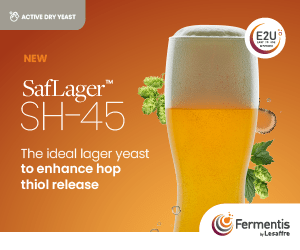Highland Brewing Co.’s Oatmeal Porter clone
(5 gallons/19 L, all-grain)
OG = 1.059 FG = 1.014
IBU = 37 SRM = 31 ABV = 5.9 %
Ingredients
8 lbs. (3.63 kg) 2-row pale malt
2.25 lbs. (1 kg) Munich malt
1 lb. (0.45 kg) crystal malt (40 °L)
0.5 lb. (0.23 kg) crystal malt (60 °L)
0.5 lb. (0.23 kg) chocolate malt
0.25 lb. (113 g) black malt
0.25 lb. (113 g) flaked oats
10 AAU Chinook hops (60 min.) (1 oz./28 g at 10% alpha acids)
1 AAU Willamette hops (0 min.) (0.25 oz./7 g at 4.1% alpha acids)
1.4 AAU Cascade hops (0 min.) (0.25 oz./7 g at 5.5% alpha acids)
Wyeast 1056 (American Ale), White Labs WLP001 (California Ale), or SafAle US-05 yeast
¾ cup corn sugar (if priming)
Step by Step
Mill the grains, then mix with 4 gallons (15.1 L) of 169 °F (76 °C) strike water to achieve a single infusion rest temperature of 152 °F (67 °C). Hold at this temperature for 60 minutes. Mashout to 170 °F (77 °C) if desired.
Vorlauf until your runnings are clear before directing them to your boil kettle. Batch or fly sparge the mash and run-off to obtain 6.5 gallons (25 L) of wort. Sparging for this beer takes 2 hours at full volume but should be quicker at home. Boil for 60 minutes, adding hops at the indicated times left in the boil. At 15 minutes left in boil, add either Irish moss or Whirlfloc as kettle fining agents.
After the boil, add the final addition of hops and whirlpool for 15 minutes before rapidly chilling the wort to 62 °F (17 °C). Pitch yeast. Fermentation begins at 62 °F (17 °C) but is raised to 70 °F (21 °C) for a diacetyl rest near the end of active fermentation.
Once primary fermentation is complete and the beer has settled, which can be hastened by cold crashing to 32 °F (0 °C), bottle or keg the beer and carbonate to approximately 2.5 volumes.
Highland Brewing Co.’s Oatmeal Porter clone
(5 gallons/19 L, extract with grains)
OG = 1.060 FG = 1.015
IBU = 37 SRM = 30 ABV = 5.9%
Ingredients
4.5 lbs. (2 kg) extra light dried malt extract
1 lb. (0.45 kg) Munich dried malt extract
1 lb. (0.45 kg) crystal malt (40 °L)
0.5 lb. (0.23 kg) crystal malt (60 °L)
0.5 lb. (0.23 kg) chocolate malt
0.25 lb. (113 g) black malt
0.25 lb. (113 g) flaked oats
10 AAU Chinook hops (60 min.) (1 oz./28 g at 10% alpha acids)
1 AAU Willamette hops (0 min.) (0.25 oz./7 g at 4.1% alpha acids)
1.4 AAU Cascade hops (0 min.) (0.25 oz./7 g at 5.5% alpha acids)
Wyeast 1056 (American Ale), White Labs WLP001 (California Ale), or SafAle US-05 yeast
¾ cup corn sugar (if priming)
Step by Step
Bring 6.5 gallons (25 L) of water to roughly 150 °F (66 °C). Steep all the specialty malts in a muslin bag for 15 minutes before removing and draining. Add both extracts, with stirring, before heating to a boil. Boil for 60 minutes, adding hops at the indicated times left in the boil. At 15 minutes left in boil, add either Irish moss or Whirlfloc as fining agents.
After the boil, add the whirlpool hops indicated and whirlpool for 15 minutes before rapidly chilling the wort to 62 °F (17 °C). Pitch yeast. Fermentation begins at 62 °F (17 °C) but is raised to 70 °F (21 °C) for a diacetyl rest near the end of active fermentation.
Once primary fermentation is complete, and the beer has settled, which can be hastened by cold crashing to 32 °F (0 °C), bottle or keg the beer and carbonate to approximately 2.5 volumes.
Tips for Success:
The largest hurdle to brewing this beer is avoiding the harsh, astringent character that can come from the use of roasted malts. Also, if your mash pH is too low, you’ll end up with a thin, lifeless brew with the nuances of chocolate malt. Aim for a mash pH slightly higher than the normally acceptable range, 5.4–5.5, to circumvent both problems.
Secondly, you’ll want to make a yeast starter if using one of the liquid strains. Although the brew isn’t of the high-octane variety, without a proper pitch you’ll probably end up with slight under-attenuation and/or subtle off-flavors developing. A clean fermentation to allow the chocolate and coffee notes to shine is key here.






